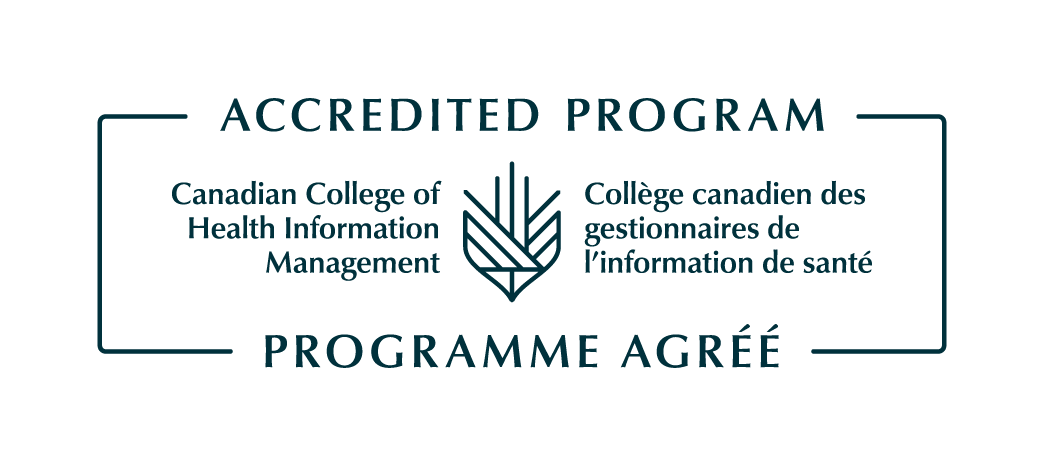Health Information Management
The Fleming College Health Information Management (HIM) program is one of only three Canadian Health Information Management Association (CHIMA) recognized college programs available in Ontario.

Program Information
Start Date
September 02, 2025
Domestic Availability
Accepting Applications
International Availability
Accepting Applications
CIP Code
51.0706
Program Code
HIM
Delivery
Hybrid
Credential
Ontario College Diploma
Academic School
Location
Program Contact
Domestic Tuition
$2499.6 per semester*
International Tuition
$8826.1 per semester*
*Domestic tuition amounts shown are from the 2024-2025 academic year and are subject to change.
*International tuition amounts shown are from the 2024-2025 academic year and are subject to change.
View Curriculum
In this challenging two-year diploma program, students will learn to use computer technologies to capture and analyze data, for use in patient care, decision support, funding and planning. Health records are the primary source of information used by hospitals and health care facilities to code services for reimbursement purposes. This information is also needed by public health officials to indicate disease patterns and trends, and by medical researchers for analysis, comparison and decision support.
Health service careers are among the fastest growing occupations in the economy. In the healthcare field, this really is the information age. There's a whole new growth market for the skills and training of health information management and health records professionals. An aging population and increasing health care needs, combined with the focus on accountability, efficiency and effectiveness of health care services delivery, has led to a skills shortage. You will graduate equipped with very marketable skills in the health information management sector. Some of those skills will include expertise in the following areas:
- data quality
- data collection and coding
- record /systems management
- privacy, confidentiality and security of health information
- transitioning to the electronic health record
This program is accredited by the Canadian Health Information Management Association (CHIMA).

The Canadian College of Health Information Management sets the accreditation standards for educational institutions offering health information programs in Canada.
Accreditation demonstrates to the public that a program is aligned to industry standards, as identified through the College’s needs assessment and consultation with industry. It is a voluntary, self-regulatory process to recognize those that meet or exceed the standards set for health information education. The purpose of accrediting programs is to ensure continuous quality improvement of the educational content to support the evolving health information industry.
Graduates are eligible to write the National Certification Examination of the Canadian College of Health Information Management. To learn more about the Health Information Management profession and the certification exam, please visit www.echima.ca.
"This program combines my love of technology with my knowledge of health sciences. You can’t make decisions in the best interest of patient care and the hospital without Health Information Management. This program really prepared me for a rewarding and challenging career. The instructors were either currently working in the field or had worked in it, so they gave us first-hand knowledge of the real world. The dedicated computer lab for our program was always open for us to practice. And my placements helped me practice what I learned in the lab. I was able to see, how a hospital flows and how it all comes together. If you have an interest in healthcare but don’t want to be on the front lines, this is an amazing way to contribute to make the system better. Everything we learned in the program I use every single day. "
Dana Hayes, HB. Sc., CHIM
Decision Support Analyst, Ross Memorial Hospital
Fleming College has a reputation as a leader in technology-based learning. The HIM program at Fleming follows this trend with a vision of "Inspiring innovative students to become innovative leaders in HIM through applied learning." One of our mission statements is to "Espouse the state of the art in Health Information Management." We demonstrate this through our brand-new, fully-computerized lab with over 500 anonymized patient records and scanning equipment, to provide students with practical application knowledge that supports the move in healthcare to electronic health records (EHRs). A real-world populated database of patient information allows the learner to run realistic reports to support the needs of users for decision-making purposes.
Through its previous successful practicums, the HIM program has developed excellent relationships with numerous healthcare facilities throughout the region and beyond, resulting in good practicum and employment opportunities for graduates.
The program includes a strong practical component. Students will participate in two work placement experiences, a total of eight weeks in all. Students spend two weeks in a workplace setting in semester two, and four weeks in a workplace setting in semester four. Practicum components will not necessarily be in the immediate Peterborough area. Practicum agencies may require proof of immunization and a criminal records check (vulnerable sector).
This challenging and rigorous program is for those who are interested in a career where healthcare meets the cutting edge of technology. The following attributes and skills are assets for this program and career path:
- ability/willingness to work as part of a team and independently
- self-motivated
- dedicated to lifelong learning
- organized, with excellent judgment
- analytical, detail-oriented
- customer support oriented
- minimum keyboarding speed of 30 words per minute
It is strongly recommended that students possess basic Microsoft Office Suite skills (Word, Excel, PowerPoint and Internet Explorer) for research, report writing and presentations.
Graduates will be qualified for employment in a variety of health service settings and can choose the area that most interests them, including hospitals, chronic and long-term care facilities, community healthcare, mental health agencies, rehabilitation services, private clinics, health information networks, insurance and pharmaceutical industries, and government agencies and services. Your job titles could include:
- Health Record/Information Technician
- Coding Specialist
- Release of Information Specialist
- Health Record/Information Administrator
- Data Analyst
- Data Quality Specialist
Starting salaries per year are in the $50,000 to $55,000 range. The recently released "Health Informatics and Health Information Management Human Resources Report" confirms the increasing demand for qualified Health Informatics (HI) and Health Information Management professionals, and projects significant labour and skills shortages in this field in the near future.
| Semester 1 | Semester 2 | Semester 3 | Semester 4 | |
|---|---|---|---|---|
| Textbook Cost | $2,019.00 | $435.00 | ||
| Kit Cost | ||||
| Field Placement expenses | Travel and or parking costs - varies depending on placement location | |||
| Uniforms/program shirts | ||||
| Professional Exam Cost | Currently $498 + taxes. Subject to change without notice. | |||
| NARS Cost | Mask Fit $50 | Police Check $50, TB test$50 | ||
| Portfolio Builders | ||||
As well, in your role as a future HIM professional, you will be expected to join the national and provincial HIM organizations as a student member, a cost of approximately $60.00.
Non Academic Requirements
Your program has mandatory requirements which may include a criminal reference check, first aid, CPR-C, etc. For more information, please see the Non Academic Requirements page.
Failure to provide any of the required Non Academic Field Requirements by the specified due date will result in an inability to participate in the mandatory placement components of the program.
- Keep current with relevant local, national and global health care and health information management issues, trends, technologies and standards to support health information management systems and processes and guide professional development.
- Assess personal health information from individual client visits for accuracy, completeness & consistency using knowledge of biomedical sciences, medical diagnoses and interventions, causes of diseases, & medical terminology, abbreviations & acronyms.
- Apply current, accurate codes and standards to relevant personal health information from individual client visits using health information, coding, classification and abstracting systems proficiently.
- Comply with the legal obligations, as well as with the professional, ethical and organizational standards that ensure privacy, security and confidentiality in the access, retention, storage and disposal of personal health information.
- Contribute to the development, implementation and evaluation of health information management practices, policies and processes to support client care, organizational goals, operations, and regulatory compliance.
- Participate in maintaining the completeness, accuracy, consistency, timeliness and integrity of health information throughout the management of its lifecycle.
- Use knowledge of systems systems interoperability standards, database architecture, software versioning, classification and terminology mapping, data collection requirements, legal obligations, and the health information management lifecycle, and apply fundamental project management principles and practices to support the procurement and implementation of health information management systems.
- Retrieve and release personal health information in response to legitimate requests, in accordance with statutory requirements, and within specified deadlines.
- Participate in the retrieval, analysis and presentation of relevant health information to stakeholders to support organizational decision-making, epidemiological studies and clinical research.
- Work professionally, ethically and collaboratively with stakeholders and as a member of the interdisciplinary health care team, within a structured, regulated and evolving system of health care, to enhance the collection, distribution, use, security and awareness of quality health information and its impact on client care.
- Use current and emerging technologies to support the management, analysis and presentation of health information.
Students applying to Health Information Management must meet the following requirements:
- OSSD including Gr 12 C English, Gr 11 C Math and any two Gr 11 or 12 C Sciences
Transfer Agreements
You may be able to use credits obtained at Fleming College to continue your postsecondary education in pursuit of a degree. The articulation and credit transfer agreements with our partner institutions are summarized here.
Bachelor of Applied Health Information Science
Requirement
- Minimum 70% cumulative program average.
- Completion of the Conestoga College Bridge.
Transfer Credit
- 16 out of a 46-course degree.
- Refer to ONTransfer.ca for further details.
To apply please see the Ontario Colleges website.
For more information
Visit the Conestoga College website for further articulation and program information.
Visit the ONTransfer.ca website for agreement information.
Bachelor of Allied Health Science
Requirement
- Minimum mid-70% cumulative program average.
- Completion of the Ontario Tech Allied Health Sciences Bridge.
Transfer Credit
- 57 out of a 120-credit degree.
- Refer to ONTransfer.ca for further details.
To apply please see the Ontario Universities' Application Centre (OUAC) website.
For more information
Visit the Ontario Tech University website for further articulation and program information.
Visit the ONTransfer.ca website for agreement information.
Bachelor of Arts in Educational Studies and Digital Technology
Requirement
- Minimum mid-70% cumulative program average.
Transfer Credit
- 60 out of a 120-credit degree.
- Refer to ONTransfer.ca for further details.
To apply please see the Ontario Universities' Application Centre (OUAC) website.
For more information
Visit the Ontario Tech University website for further articulation and program information.
Visit the ONTransfer.ca website for agreement information.
Bachelor of Arts in Psychology
Requirement
- Minimum mid-70% cumulative program average.
Transfer Credit
- 60 out of a 120-credit degree.
- Refer to Ontario Tech's website for further details.
To apply please see the Ontario Universities' Application Centre (OUAC) website.
For more information
Visit the Ontario Tech University website for further articulation and program information.
Bachelor of Commerce
Requirement
- Minimum mid-70% cumulative program average.
- Completion of the Ontario Tech Commerce Bridge.
Transfer Credit
- 45 out of a 120-credit degree.
- Refer to ONTransfer.ca for further details.
To apply please see the Ontario Universities' Application Centre (OUAC) website.
For more information
Visit the Ontario Tech University website for further articulation and program information.
Visit the ONTransfer.ca website for agreement information.
Bachelor of Interdisciplinary Studies
Requirement
- Minimum 65% cumulative program average.
Transfer Credit
- Entry into 5th semester standing in an 8-semester program.
- Refer to Seneca College's website for further details.
To apply please see the Ontario Colleges website.
For more information
Visit the Seneca College website for further articulation and program information.
Visit the ONTransfer.ca website for agreement information.
See the official articulation agreement.
Bachelor of Arts
Requirement
- Minimum 75% cumulative program average.
Transfer Credit
- 5 out of a 20-credit degree (Cohort: Fall 2023 - Present).
- Refer to ONTransfer.ca for further details.
To apply please see the Ontario Universities' Application Centre (OUAC) website.
For more information
Visit the Trent University website for further articulation and program information.
Visit the ONTransfer.ca website for agreement information.
See the official articulation agreement.
Bachelor of Science
Requirement
- Minimum 75% cumulative program average.
Transfer Credit
- 5 out of a 20-credit degree (Cohort: Fall 2023 - Present).
- Refer to ONTransfer.ca for further details.
To apply please see the Ontario Universities' Application Centre (OUAC) website.
For more information
Visit the Trent University website for further articulation and program information.
Visit the ONTransfer.ca website for agreement information.
See the official articulation agreement.
